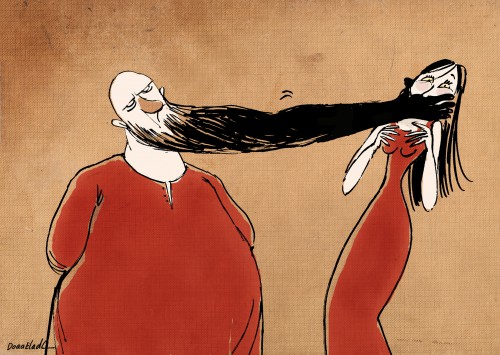Freedom of Speech Roundup
by Sampsonia Way / July 13, 2013 / No comments
In the weekly Freedom of Speech Roundup, Sampsonia Way presents some of the week’s top news on freedom of expression, journalists in danger, artists in exile, and banned literature.

The Voice of Egyptian Women by Doaa El Adl.
Egypt’s Fault Lines, and its Cartoons
The New Yorker. The cartoonists of Egypt have been as divided as the rest of the country about the military’s removal of President Mohamed Morsi from power on July 3rd. Read here.
Egyptian Press Under Fire After Morsi’s Ouster
CPJ. Dozens of anti-press assaults have been reported amid protests after the ouster of Mohamed Morsi. At least two journalists are dead and numerous others beaten, while several news outlets are being censored by the government. Read here.
Huffington Post. Upon taking power and unseating the first democratically elected president, the military immediately shut down several Egyptian and Arab television stations and arrested numerous journalists. Read here.
Index on Censorship. After the fall of Egypt’s Islamist president this month, security officials shut down media linked to the Muslim Brotherhood. With a history of biased media and an increasingly divided nation, the future of Egypt looks grim. Read here.
Journalist Gunned Down in Russia’s Restive Dagestan
Washington Post. Akhmednabi Akhmednabiyev, an editor at a weekly newspaper critical of authorities and a contributor to leading online source Caucasian Knot, was gunned down in his car by unknown attackers outside his home. He died on the spot. Read here.
Iran to Provide Citizens with Official State Email Addresses
The Guardian. The Iranian government has announced that it will issue official state email addresses and reiterated claims that it will build its own intranet, raising censorship concerns within the country. It is still unknown how the president-elect will react to this move. Read here.
Newspaper Attacks Spur Press Freedom Fears in Hong Kong
The Wall Street Journal. Plagued by the most dramatic low in press freedom since it returned to Chinese rule in 1997, Hong Kong’s journalists are practicing self-censorship to stay in business. Read here.
Risking it All to Film the Paradoxes of Thai Democracy (Q & A)
Hollywood Reporter. Pen-ek Ratanaruang, one of Thailand’s most celebrated working directors, discusses his new documentary on the complicated and hidden history of the country’s move to democracy, and how the film was censored. Read here.
Trailer for Pen-ek Ratanaruang’s documentary. Video: Himhai Monachee via YouTube.
Targeting “Rumors” on China’s Sina Weibo
Global Voices. “Sina Weibo, China’s most popular social media platform, introduced a community code of practice (CoP) in May 2012. A since-established CoP Community Center manages a demerit point system that has been set up to punish users who violate its rules. The rules prohibit the distribution of commercial spam, indecent materials, and ‘rumors.'” Read Here.
Myanmar’s Press Council Opposes New Media Legislation, Filmmakers Test Censors and Audiences
Irrawaddy. The Printing and Publishing Enterprise Bill gives the Ministry of Information broad powers to issue and revoke publication licenses, and journalists from Burma’s interim Press Council have threatened to resign if it is passed by the Upper House in its current form. Read here.
Hollywood Reporter. The rules have relaxed significantly in the Burmese film industry since the country began its democratic reform process. In the past, censors were notorious for chopping scenes that included anything negative about the military regime or that tarnished Myanmar’s very traditional way of life. However, today limitations still exist. Read here.
Censorship: The Problem Child of Burma’s Dictatorship
Index on Censorship. Writer and artist Htoo Lyin Myo gives his personal account of working under government censorship in Burma. Read here.
Lincoln’s Surveillance State
The New York Times. Letters between President Abraham Lincoln and his secretary of war reveal the wide-scale monitoring of telegraph lines during the Civil War. Read Here.
Vietnam Censors Give Songwriter Ngoc Gai “Free Advertising”
Asean Beat. The musician Ngoc Gai bypassed the government’s censorship board in order to be “completely free,” sharing lyrics that hope for social, cultural, and political reform. Read Here.
Liu Yiwu’s Book. Prison of the Mind
The New Yorker. A dissident Chinese poet’s memoir of incarceration. Read here.
Online Survival Kit: How Can You Protect Yourself From Online Snooping?
Reporters without Borders. In the past ten days, the Guardian and the Washington Post newspapers have revealed the existence of a mass surveillance program created by the US government. These revelations confirm that journalists, bloggers, and netizens need not only circumvent censorship, but also to master tools and techniques that will help shield them from mass surveillance, both in countries that are Enemies of the Internet and in the leading western democracies. Read here.




